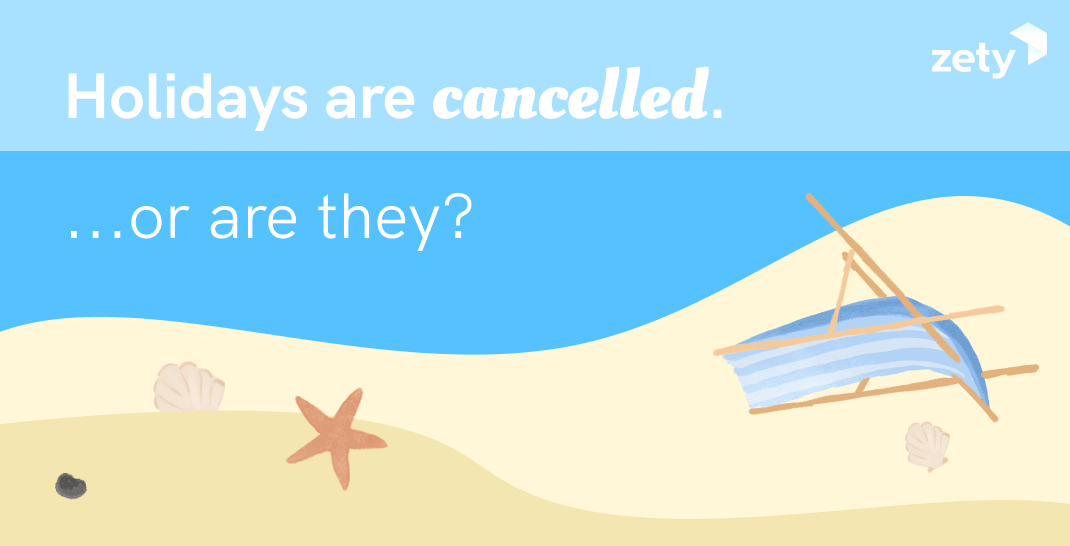The Lockdown Is Killing Me But I’ll Never Travel Again
Create your CV now
Stay home. If you can. Or not. Go to the beach. Or a park. But not in Wales nor Scotland. Go to work. But do not use public transport. At the same time, remember that public transport is available for you to use.
Learning the government’s regulations on social distancing and overall public life gives you as much mental stability as going from barely surviving COVID-19 in an ICU to welcoming your sixth newborn child within two weeks.
These are perplexing times, to say the least. While we are desperate to do anything else than being locked down indoors, it is hard to tell what actually is allowed and what is not.
We decided to look into one of our common longings that currently seems more distant than others: travelling. Has the coronavirus caused the people to cancel all of their travel plans? Will the COVID-19 pandemic change the travel industry forever? Here is what we found out:

The future of travel: an overview
Before we got into details, we wanted to see the broad picture. In simplest terms, just how much our travelling habits will change amid the COVID-19 scare? Turns out, *very* much:
- In 2019, 91% of respondents travelled out of their cities for holidays.
- When it comes to the summer of 2020, merely 19% of respondents said they would travel for leisure at all.
Ouch.
Actually, most people already had to give up on their 2020 travel plans because of the coronavirus pandemic. 78% of respondents said they had already cancelled some of their 2020 trip bookings.
Just to put the data into perspective: domestic tourism alone amassed a spending of approximately 23 billion British pounds a year between 2011 and 2018. Even in the most moderate forecast, we are eyeing a 50% drop in this figure in 2020.
What about going on international trips?
- In 2019, 39% of respondents went on holidays abroad.
- In 2020, only 15% are planning to do so.
Outbound tourism market value was twice as high as the domestic tourism in 2018: the total amount spent on visits abroad reached around 45.4 billion British pounds in 2018. According to the data self-reported by our respondents, we can expect a 42% fall in the annual expenditure on UK’s residents’ visits abroad in 2020.
Interestingly, there were significant differences between particular occupations and generations:
- 31% of people employed in the software/IT industry said they would go on holidays abroad in 2020 (53% did in 2019), compared to only 10% of the education industry (38% did in 2019) and merely 7% of retail/wholesale/distribution (26% in 2019).
- 20% of Millennials are planning to take a trip abroad in 2020, compared to just 4% of Baby Boomers.
Since the older generations are at a higher risk of developing severe illness from coronavirus, it is understandable they are more hesitant to travel abroad—it entails spending time in crowded places such as airports or train stations, where germs are easily transmitted.
The drastic drop in international travel amongst education workers is likely caused by the fact the education industry is predicted to take the heaviest blow from the coronavirus crisis: the Office for Budget Responsibility predicts a 90% output loss for education between April and June (compared to a 35% decrease for the whole economy).
The primary reason for so steep a decline in travel in 2020 is fairly obvious. People nowadays are scared of travelling:
- 66% of respondents said they were afraid to travel—women slightly more often than men (69% vs 63%).
- 64% said that even if the crisis seems to be defused, they will still refrain from travelling.
Moreover, it has a lot to do with the way we tend to plan our trips:
- In 2019, 91% of people planned their holidays in advance.
- Only 17% booked last-minute trips.
The uncertainty caused by ever-changing restrictions and regulations makes it difficult to plan any holidays ahead—just to stay on the safe side, most people are choosing to postpone their voyage.
Postpone—until when, though?
We asked our respondents when was the soonest they might consider going on holidays again. The responses were:
- Summer 2020: 29% of respondents
- September: 11%
- October: 7%
- November: 5%
- December: 6%
- No sooner than in 2021: 41%
Not surprisingly, the most distant option proved the most popular. Speaking of which...
Imagine you do not get to travel for leisure at all in 2020. By 2021, you will have saved a decent amount of dough (unless corona costs you a job along the way). We were curious to find out if, in case of not going on holidays in 2020, people would overcompensate and go on a “better” trip the following year.
39% of respondents said they would go on uber-fancy holidays in 2021. Including:
- 52% of people working in Software/IT
- 51% in Business and Finance
- 42% in Healthcare
- 36% in Education
- 21% in Retail, Wholesale and Distribution.*
* Only industries with over 100 of respondents were included in the analysis.
The obvious correlation here is between an average wealth of a given group of respondents and their likelihood of making a 2021 travel splurge. IT, Finance and Banking are amongst the top 10 best-paid industries in the UK. Tech or Finance employees are more likely to save up larger amounts of money they can later spend on holidays when international travel CVs.
“When all this is over,” will we remain reluctant to travel?
Even if some of us will try and make up for the lost holiday opportunities, it remains likely that the current pandemic chaos will alter our travelling habits for good:
- 47% of respondents said, in the future they would travel abroad less often than they used to, due to health and safety concerns.
- Unsurprisingly, Baby Boomers are most likely to refrain from international travel in the future: 57% of them said they would cut down on travelling abroad.
The demographic least concerned about the potential risk of international trips to come? Healthcare workers!
Only 41% of them said they would reduce their international excursions in the future. If anyone is the wiser here, it is them. So—perhaps the rest of us should dispel our “irrational” fears, too?
What does it all mean for our work-life balance and mental well-being?
Truth be told, the picture emerging here is pretty grim. It is reasonable to assume the COVID-19 crisis will continuously take its toll on the travel and leisure industry, as well as our personal lives: going on holidays has been proven to increase well-being and decrease stress levels. Other studies found that even a short holiday can improve stress-management bodily functions and reduce the likelihood of developing depressive disorders.
Medical research notwithstanding, how do we feel about the importance of travelling for detaching mentally from work?
34% of respondents said they can fully relax from work only if they travel outside their city. Including:
- 45% of Software/IT workers
- 42% employed in Business and Finance
- 35% employed in Retail, Wholesale and Distribution
- 32% employed in Education
- 26% of healthcare workers
Finally, younger people are in a bigger need to travel to take their minds off office life than older generations:
- 39% of Gen Z and Millennials claim they can only relax on holidays
- 32% of Gen X
- 22% of Baby Boomers
Which is in line with Eurostat’s data about tourism trends in different generations: senior tourists (65+) travel less often than younger people. In 2018, over half of European residents aged 65+ did not participate in tourism at all. Older tourists tend to take longer trips than the young ones, but do not do it every year.
What about you? Have you already cancelled all the trips you planned for this year? Do you think you will travel less than you used to? Let us know it the comments.
Methodology and limitations
For this study, we collected answers from 934 respondents via Amazon's Mechanical Turk. Respondents consisted of 49% females and 51% males. 9% of respondents were 24 or younger, 41% aged 25–38, 31% aged 39–58 and 19% 59 or older.
This self-report study investigated how the coronavirus pandemic has changed people’s approach to travelling. Respondents were asked 11 close-ended questions and 6 scale-based questions. To help ensure that respondents took our survey seriously, all respondents were required to identify and correctly answer two attention-check questions.
Some questions and responses have been rephrased or condensed for clarity and ease of understanding for readers. In some cases, the percentages presented may not add up to 100 percent; depending on the case, this is either due to rounding or due to responses of “neither/uncertain/unknown” not being presented.
As experience is subjective, we understand that some participants and their answers might be affected by recency, attribution, exaggeration, self-selection, non-response or voluntary response bias.
Given the gender and age makeup of our large sample, the study can be generalized to the entire population.
Fair use statement
Feel free to share our study! The graphics and content found here are available for non-commercial reuse. Just make sure to link back to this page to give the author proper credit.
About Zety’s Editorial Process
Our editorial team has thoroughly reviewed this article to ensure it follows Zety’s editorial guidelines. Our dedication lies in sharing our expertise and providing you with actionable career advice that offers you real value. Every year, the quality of our content attracts 40 million readers to our site. But that’s not all – we conduct original research to gain a detailed understanding of the labour market. We take pride in being cited by top universities and leading media outlets in the UK and worldwide.
Sources
- Annual domestic overnight tourism spending in Great Britain from 2010 to 2024 | Statista
- Total expenditure on visits abroad from the United Kingdom from 2007 to 2024 | Statista
- The best industries for high-paying jobs in Britain | Yahoo Finance
- Employee earnings in the UK: 2019 | Office for National Statistics
- Coronavirus analysis | Office for Budget Responsibility
- Cornelia Blank et al., Short Vacation Improves Stress-Level and Well-Being in German-Speaking Middle-Managers—A Randomized Controlled Trial
- Tourism trends and ageing | eurostat
About Us
Zety empowers candidates to succeed on their job hunt with guidance on writing the perfect CV and beyond, professional CV examples, and CV templates. Use our best cover letter samples to complete your application, and start getting ready for that job interview.
About Zety’s Editorial Process
Our editorial team has thoroughly reviewed this article to ensure it follows Zety’s editorial guidelines. Our dedication lies in sharing our expertise and providing you with actionable career advice that offers you real value. Every year, the quality of our content attracts 40 million readers to our site. But that’s not all – we conduct original research to gain a detailed understanding of the labour market. We take pride in being cited by top universities and leading media outlets in the UK and worldwide.



